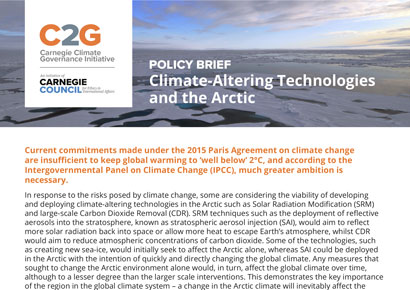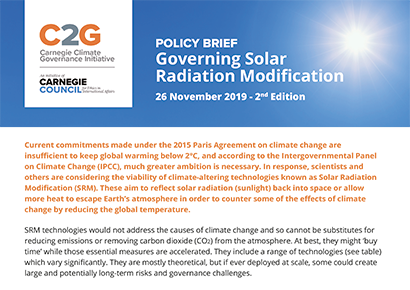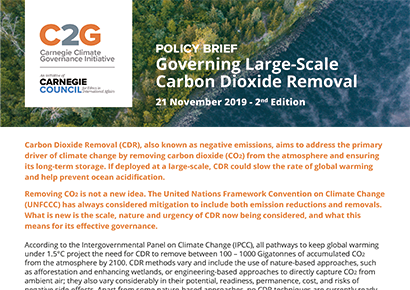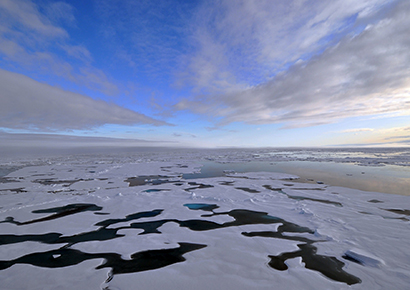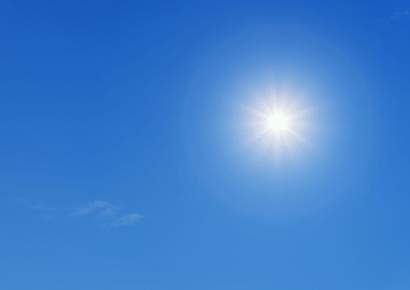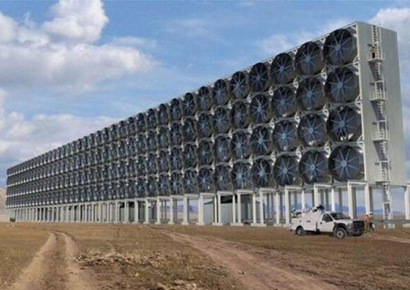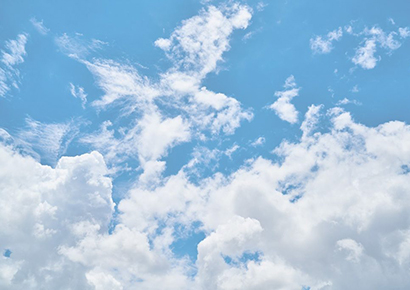C2GLearn
Climate-altering approaches
and the Arctic
This topic aims to offer an opportunity to learn more about climate-altering approaches in the context of the Arctic region and the need for their governance. It seeks insights into the following questions:
- What is the role of the Arctic in the global climate and the geopolitics of a warming Arctic?
- How can we situate climate-altering approaches, including large-scale Carbon Dioxide Removal (CDR) and proposed Solar Radiation Modification (SRM) technologies in such a context, and why governance is important?
- What approaches may (and may not) be relevant to the Arctic environment and if ever used, how might they effect both the Arctic and its environment, and the global climate?
- How might the physical and political context of the Arctic effect the capacity to efficiently and effectively undertake CDR or SRM in the region?
- What are the key governance issues, challenges and implications of undertaking research into, and the potential deployment of these approaches?
- How might some of the governance challenges be considered or addressed in the current Arctic governance processes and mechanisms?
Webinars
This Webinar will feature three ten-minute expert overviews on the climate-altering approaches in the Arctic. It will be followed by a forty-five minute moderated Q&A session, during which audience members will be invited to submit written questions via the Zoom chat. Speakers include:
Douglas MacMartin / United States of America
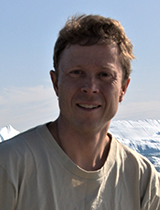 Douglas MacMartin is a Senior Research Fellow in the Sibley School of Mechanical and Aerospace Engineering at Cornell University. His research focuses on climate engineering (also known as solar geoengineering or climate intervention) with the aim of helping to develop the knowledge base necessary to support informed future societal decisions in this challenging and controversial field. He has published extensively on the subject, and in addition to public and academic presentations has provided briefings to the UN Environment Program and testimony to the US Congress, and is a member of a US National Academies panel that will make recommendations on both research and governance. He received his Ph.D. in Aeronautics and Astronautics from MIT in 1992; previous positions include United Technologies Research Center (1994-2000) and the California Institute of Technology (2000-2015). His research is funded by NSF and by the Cornell University Atkinson Center.
Douglas MacMartin is a Senior Research Fellow in the Sibley School of Mechanical and Aerospace Engineering at Cornell University. His research focuses on climate engineering (also known as solar geoengineering or climate intervention) with the aim of helping to develop the knowledge base necessary to support informed future societal decisions in this challenging and controversial field. He has published extensively on the subject, and in addition to public and academic presentations has provided briefings to the UN Environment Program and testimony to the US Congress, and is a member of a US National Academies panel that will make recommendations on both research and governance. He received his Ph.D. in Aeronautics and Astronautics from MIT in 1992; previous positions include United Technologies Research Center (1994-2000) and the California Institute of Technology (2000-2015). His research is funded by NSF and by the Cornell University Atkinson Center.Ilona Mettiäinen / Finland
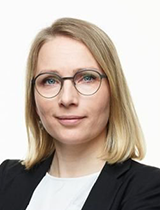
Pam Pearson / United States of America
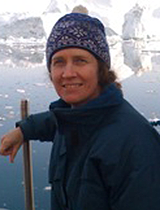 Pam Pearson is the Director and Founder of the International Cryosphere Climate Initiative. She served for 20 years as a U.S. diplomat with the Department of State, with postings to Ecuador, Sweden and Norway; and worked also on global issues such as climate change, international health including HIV/AIDS, and nuclear security and non-proliferation. After leaving government, she worked as a consultant to various climate organizations and to the first Norwegian Arctic Council chairmanship, and subsequently founded ICCI in 2010 to bring a science-policy focus to the rapid changes occurring in the Arctic, as well as all cryosphere (snow and ice) regions throughout the globe. ICCI, a registered non-profit research and independent organization in both the U.S. and Sweden, stresses the importance of cryosphere preservation to the global climate system, working with multilateral organizations such as the UNFCCC, UNEP, WMO and academic institutions. ICCI also conducts mitigation demonstration projects with co-benefits to human health and food security, especially through measures to address black carbon emissions near cryosphere. Ms. Pearson served as a reviewer of both the IPCC Special Reports on 1.5 Degrees, and Oceans and Cryosphere; and holds degrees from Rice University (BS) and the University of Texas School of Public Health (MS).
Pam Pearson is the Director and Founder of the International Cryosphere Climate Initiative. She served for 20 years as a U.S. diplomat with the Department of State, with postings to Ecuador, Sweden and Norway; and worked also on global issues such as climate change, international health including HIV/AIDS, and nuclear security and non-proliferation. After leaving government, she worked as a consultant to various climate organizations and to the first Norwegian Arctic Council chairmanship, and subsequently founded ICCI in 2010 to bring a science-policy focus to the rapid changes occurring in the Arctic, as well as all cryosphere (snow and ice) regions throughout the globe. ICCI, a registered non-profit research and independent organization in both the U.S. and Sweden, stresses the importance of cryosphere preservation to the global climate system, working with multilateral organizations such as the UNFCCC, UNEP, WMO and academic institutions. ICCI also conducts mitigation demonstration projects with co-benefits to human health and food security, especially through measures to address black carbon emissions near cryosphere. Ms. Pearson served as a reviewer of both the IPCC Special Reports on 1.5 Degrees, and Oceans and Cryosphere; and holds degrees from Rice University (BS) and the University of Texas School of Public Health (MS).Moderator: Qi Zheng / China
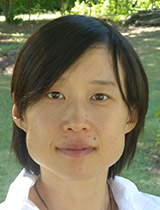 Qi ZHENG has over 8 years of experience working on climate change and development. She is an Outreach Officer at C2G in charge of engaging governments and intergovernmental organisations.
Qi ZHENG has over 8 years of experience working on climate change and development. She is an Outreach Officer at C2G in charge of engaging governments and intergovernmental organisations.
Qi previously worked as programme manager for the UK Committee on Climate Change on a UK-China cooperation on climate risks. Prior to that, she spent 5 years in China working as policy officer on climate change for the British Embassy in Beijing and as campaign officer for Oxfam Hong Kong.
Presentations
Slide presentations
- Pam Pearson Cryosphere and Climate-Altering Technologies (CAT): An Arctic-Plus View: Cryosphere Thresholds, Emissions Reductions and Implications for CAT [pdf]
- Douglas MacMartin Climate-altering approaches & the Arctic: Carbon-dioxide removal & Solar Radiation Modification [pdf]
- Ilona Mettiäinnen Arctic viewpoints to the governance of climate-altering approaches [pdf]
Q&A (Webinar 1)
Q&A (Webinar 2)
Campfire Chat: Large-scale Carbon Dioxide Removal and the Arctic
This Campfire Chat aimed to provide insights into diverse viewpoints on how to situate large-scale Carbon Dioxide Removal (CDR) approaches in the context of the Arctic, and why their governance is both important and challenging. It was a relatively informal, moderated, semi-structured discussion between experts. Audience members were invited to suggest topics via the Zoom chat. Guests included:
Brad Ack / United States of America
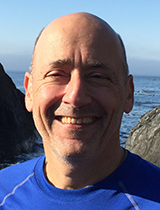
Brad is an environmental innovator with 30 years of creative contributions towards a more sustainable world. His work has spanned from the tropical forests of Latin America, to the high deserts of the American southwest, the Pacific NW to work throughout the global ocean. Brad has worked for both government and NGOs at senior levels, in concert with the private sector, designing and implementing innovative conservation and sustainability initiatives.
Brad recently launched Ocean-Climate Trust, to centre attention on the ocean as a critical pathway to arrest climate disruption and in so doing, restore the ocean. The Trust is working to build momentum for a new ocean-climate restoration agenda; to unlock new intellectual and financial investments in ocean-climate restoration; to source, develop and scale innovations that utilise the ocean’s capacity to capture and store carbon, and that can repair and restore critical components of the ocean-climate system.
Previously Brad served as Senior Vice President, Oceans at WWF-US; Regional Director-Americas for the Marine Stewardship Council; and Executive Director of the Puget Sound Recovery Program in the State of Washington. He directed conservation programs for the Grand Canyon Trust and started his career in Latin America working on sustainable development around protected areas.
Brad is passionate about recognising the climate emergency we are in and building a more effective agenda to address and arrest dangerous climate disruption.
Halldór Thorgeirsson / Iceland
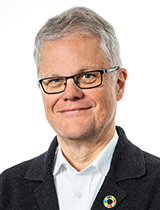
Before joining the secretariat, Halldór served as the Chair of the UNFCCC Subsidiary Body for Scientific and Technological Advice (SBSTA) for a two-year term. His research activities included studies of nitrogen cycling, the impact of elevated carbon dioxide on the carbon balance of trees in situ and measurements of fluxes of carbon dioxide and water over crops and forest canopies and of methane from Arctic wetlands. He holds a Ph.D. in Plant Ecophysiology from Utah State University.
Pam Pearson / United States of America

Shawna Larson / United States of America
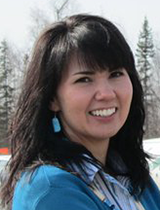
Janos Pasztor / Hungary & Switzerland (Moderator)
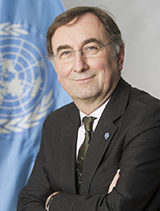 Janos Pasztor (a Hungarian and a Swiss citizen) is Senior Fellow of the Carnegie Council for Ethics in International Affairs, and is Executive Director of the Carnegie Climate Governance Initiative (C2G).
Janos Pasztor (a Hungarian and a Swiss citizen) is Senior Fellow of the Carnegie Council for Ethics in International Affairs, and is Executive Director of the Carnegie Climate Governance Initiative (C2G).
He has four decades of work experience in the areas of energy, environment, climate change, and sustainable development. Before taking up his current assignment he was UN Assistant Secretary-General for Climate Change in New York under Secretary-General Ban Ki-moon.
Earlier, he was Acting Executive Director for Conservation (2014), and Policy and Science Director (2012-2014), at WWF International. He directed the UNSG’s Climate Change Support Team (2008-2010) and later was Executive Secretary of the UNSG’s High-level Panel on Global Sustainability (2010-2012). In 2007 he directed the Geneva-based UN Environment Management Group (EMG). During 1993-2006 he worked and over time held many responsibilities at the Climate Change Secretariat (UNFCCC), initially in Geneva and later in Bonn.
His other assignments included: the Secretariat of the UN Conference on Environment and Development (Earth Summit ’92); Stockholm Environment Institute; United Nations Environment Programme (UNEP); Secretariat of the World Commission on Environment and Development (Brundtland Commission); the Beijer Institute; and the World Council of Churches.
He has BSc and MSc degrees from the Massachusetts Institute of Technology (MIT).
Campfire Chat: Solar Radiation Modification and the Arctic
This Campfire Chat aims to provide insights into diverse viewpoints on how to situate Solar Radiation Modification approaches in the context of the Arctic, and why their governance is both important and challenging. It is a relatively informal, moderated, semi-structured discussion between experts. Audience members are invited to suggest topics via the Zoom chat. Guests include:
Brad Ack / United States of America

Brad is an environmental innovator with 30 years of creative contributions towards a more sustainable world. His work has spanned from the tropical forests of Latin America, to the high deserts of the American southwest, the Pacific NW to work throughout the global ocean. Brad has worked for both government and NGOs at senior levels, in concert with the private sector, designing and implementing innovative conservation and sustainability initiatives.
Brad recently launched Ocean-Climate Trust, to centre attention on the ocean as a critical pathway to arrest climate disruption and in so doing, restore the ocean. The Trust is working to build momentum for a new ocean-climate restoration agenda; to unlock new intellectual and financial investments in ocean-climate restoration; to source, develop and scale innovations that utilise the ocean’s capacity to capture and store carbon, and that can repair and restore critical components of the ocean-climate system.
Previously Brad served as Senior Vice President, Oceans at WWF-US; Regional Director-Americas for the Marine Stewardship Council; and Executive Director of the Puget Sound Recovery Program in the State of Washington. He directed conservation programs for the Grand Canyon Trust and started his career in Latin America working on sustainable development around protected areas.
Brad is passionate about recognising the climate emergency we are in and building a more effective agenda to address and arrest dangerous climate disruption.
Durwood Zaelke / United States of America
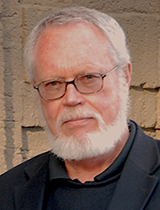
Prior to IGSD, Zaelke co-founded and served as President of the Center for International Environmental Law (CIEL) in Washington, DC and Geneva (1989-2003); was founder and director of the International & Comparative Environmental Law Program at the Washington College of Law, American University (1990-2004); founder and director of the International Program at EarthJustice (formerly the Sierra Club Legal Defense Fund) (1988-89), and director of their Alaska and DC offices (1980-89); and Director of the Secretariat for the International Network for Environmental Compliance & Enforcement (2001-2015).
Zaelke co-founded the Program on Governance for Sustainable Development at the Bren School of Environmental Science & Management, UC Santa Barbara, and is the author of International Environmental Law & Policy (with Hunter & Salzman) (6th ed. forthcoming). He is a graduate of Duke Law School (1972) and UCLA (1969). He received the UN Ozone Political Leadership Award in 2017, as well as their Scientific Leadership Award, for his work helping achieve the Kigali Amendment. He received the Climate Protection Award in 2008 from the US EPA, as well as their Ozone Protection Award, for his work accelerating the phaseout of HCFC under the Montreal Protocol explicitly for climate protection.
Helene Muri / Norway & United Kingdom
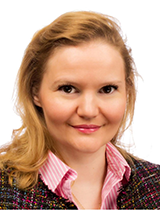
She has been working within climate change research since, with a particular focus on assessment of the climate and environmental impacts of various options to ameliorate global warming through the use of climate models. This includes various forms of geoengineering, such as stratospheric aerosol injections, marine cloud brightening, and cirrus cloud thinning, in addition to carbon dioxide removal methods such as bioenergy with carbon capture and storage. She has published almost 50 articles on geoengineering and lead several research initiatives on the subject.
She is contributing to the next reports of the Intergovernmental Panel on Climate Change (IPCC); to both Working Group I on the physical science basis, as well as Working Group III on mitigation options. She is on the steering committee of the Geoengineering Model Intercomparison Project (GeoMIP) and Carbon Dioxide Removal Intercomparison Project (CDR-MIP).
Shawna Larson / United States of America

Janos Pasztor / Hungary & Switzerland (Moderator)
 Janos Pasztor (a Hungarian and a Swiss citizen) is Senior Fellow of the Carnegie Council for Ethics in International Affairs, and is Executive Director of the Carnegie Climate Governance Initiative (C2G).
Janos Pasztor (a Hungarian and a Swiss citizen) is Senior Fellow of the Carnegie Council for Ethics in International Affairs, and is Executive Director of the Carnegie Climate Governance Initiative (C2G).
He has four decades of work experience in the areas of energy, environment, climate change, and sustainable development. Before taking up his current assignment he was UN Assistant Secretary-General for Climate Change in New York under Secretary-General Ban Ki-moon.
Earlier, he was Acting Executive Director for Conservation (2014), and Policy and Science Director (2012-2014), at WWF International. He directed the UNSG’s Climate Change Support Team (2008-2010) and later was Executive Secretary of the UNSG’s High-level Panel on Global Sustainability (2010-2012). In 2007 he directed the Geneva-based UN Environment Management Group (EMG). During 1993-2006 he worked and over time held many responsibilities at the Climate Change Secretariat (UNFCCC), initially in Geneva and later in Bonn.
His other assignments included: the Secretariat of the UN Conference on Environment and Development (Earth Summit ’92); Stockholm Environment Institute; United Nations Environment Programme (UNEP); Secretariat of the World Commission on Environment and Development (Brundtland Commission); the Beijer Institute; and the World Council of Churches.
He has BSc and MSc degrees from the Massachusetts Institute of Technology (MIT).
C2G strives to achieve a diversity of views and backgrounds across all its events. To that end, it is always open to feedback and suggestions regarding future participants and topics, to ensure a range of perspectives by sector, gender, race, geography, age and other dimensions. It will not always achieve the necessary diversity in all circumstances due to issues of availability and familiarity, but aims over time to expand the range of contributors able to address its issues, subject to the broad principles outlined in its mission statement.
